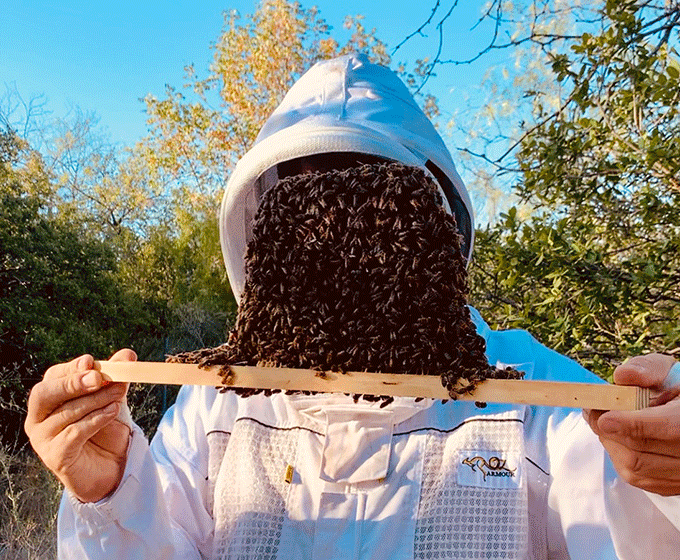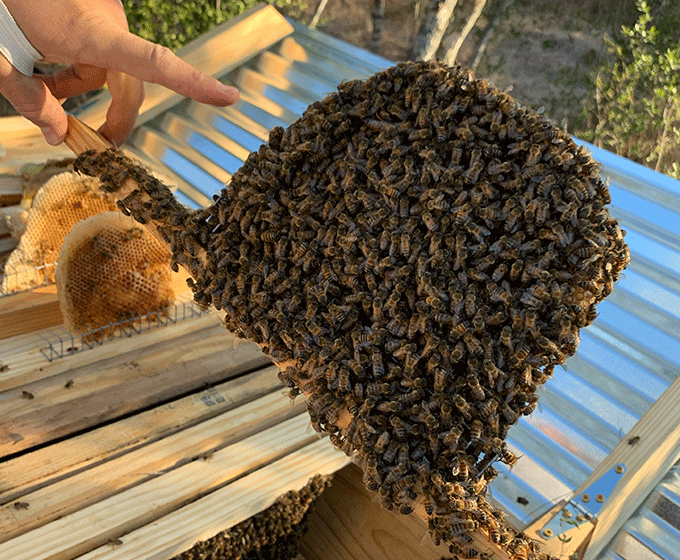
MARCH 25, 2024 — As flowers begin to bloom and temperatures increase during the spring season, bees emerge from their hives. They set off into the world to forage nectar, pollen and water within a five-mile radius of their homes. Their highest peak of foraging takes place in April and May.
On Monday, April 8, a total solar eclipse will take place across North America. The moon will slowly position itself between the Earth and the sun, draping a shadow over portions of the Alamo City known as the path of totality. The UTSA Main Campus will be on the inner edge of the path of totality, where daylight will transform to a full-moon night.
Ferhat Ozturk, an assistant professor of practice in the UTSA Department of Integrative Biology, will take the celestial opportunity to discover more about bee behavior. He is leading the project with Mariah Hopkins, professor of instruction and assistant department chair in the UTSA Department of Integrative Biology.
 Bees from Ozturk's hives.
Bees from Ozturk's hives.To date, only a handful of published papers exist on the topic.
“Different animals have been analyzed during eclipses, like in zoos for example, for decades. But bees are very under researched,” Ozturk said. “This will be very valuable data.”
Preceding the annular eclipse in October, Ozturk nestled recording devices into beehives to capture how bees behave during the progression of the solar eclipse. He’s continuing his study with the total solar eclipse just two weeks away.
Bees have their own circadian rhythm like we have. When the sun starts rising, bees exit from their homes to forage. As the sun sets, they return home. They find their way with the polarization the of the sunlight,” Ozturk explained.
Sunlight helps guide bees as they search for nectar and bring it back to their hives. Even during a cloudy day, there is still available sunlight for bees to orient themselves in the world.
“Most of them start coming back home when it gets darker. They feel the sunlight decrease. But during eclipse time if they have gone a little farther outside the five-mile radius, they’ll likely settle on a flower,” Ozturk said. “I don’t know what they are feeling, but they may feel that it’s dark and they cannot go home so it’s better to take some kind of sleep or rest on the flower. And again, when the eclipse is over, they just return to foraging.”
Ozturk, Hopkins and a team of UTSA undergraduate students will head out to the beehives an hour before the total solar eclipse to set up acoustic and visual recording devices. The team will record how bees act before, during and after the eclipse.
“We want to see if they’re humming, if they continue their dances or if they’re crowding the entrance of the hive. We’ll also be enjoying the eclipse at the same time. We have our eclipse glasses,” Ozturk said.
UTSA Today is produced by University Communications and Marketing, the official news source of The University of Texas at San Antonio. Send your feedback to news@utsa.edu. Keep up-to-date on UTSA news by visiting UTSA Today. Connect with UTSA online at Facebook, Twitter, Youtube and Instagram.
After getting your student settled in their room, connect with other UTSA families at our Family Get Together. Attendees need to RSVP for the event.
Rock & Brews Restaurant - 5702 Landmark Pkwy, San Antonio, TX 78249Late Night at the Rec is an awesome UTSA tradition that turns a typical information session into an exciting night of fun. It's a unique opportunity to meet new people and reconnect with old friends.
Campus RecreationCheer on the UTSA Soccer team as they take on Lamar in the first home game of the season.
Park West FieldShow your UTSA pride with our spirited crew—Rowdy, Cheer, the Spirits of the Roadrunner, and the incredible Spirit of San Antonio Marching Band (SOSA)—as we light up the night in true Roadrunner style.
Main Campus East Lawn, Main CampusAnnual Giving will host a First Day of School celebration to welcome students back to campus. We will have giveaways and photo opportunities.
Sombrilla Plaza, Main CampusEnjoy snacks while connecting with Adobe reps and student ambassadors. Download or log into the Adobe Express app to snag swag and unlock exclusive back-to-school templates. It’s a fun, fast way to get creative and start the school year with bold moves.
Central Plaza, Main CampusCelebrate the merger of UTSA and UT Health San Antonio with a pop-up featuring free t-shirts, exclusive swag, and interactive photo opportunities. Open to all students, faculty and staff. Supplies are limited!
Sombrilla Plaza, Main CampusThe University of Texas at San Antonio is dedicated to the advancement of knowledge through research and discovery, teaching and learning, community engagement and public service. As an institution of access and excellence, UTSA embraces multicultural traditions and serves as a center for intellectual and creative resources as well as a catalyst for socioeconomic development and the commercialization of intellectual property - for Texas, the nation and the world.
To be a premier public research university, providing access to educational excellence and preparing citizen leaders for the global environment.
We encourage an environment of dialogue and discovery, where integrity, excellence, respect, collaboration and innovation are fostered.